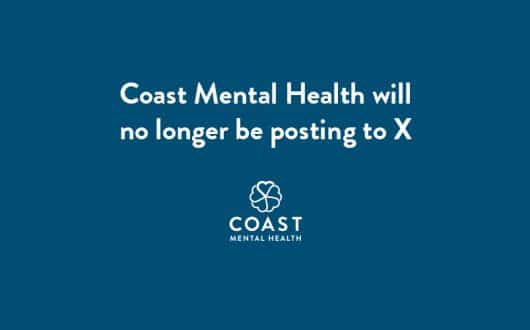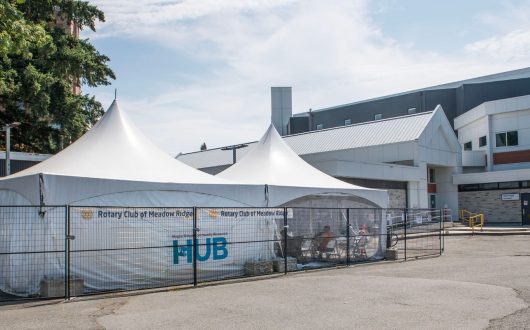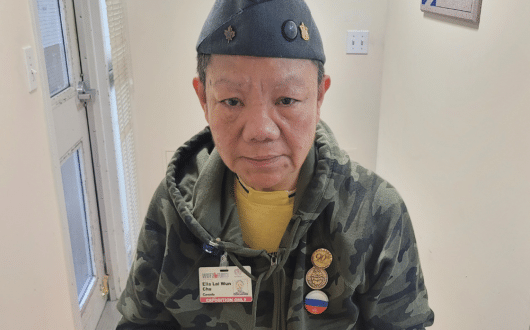Jenny’s Story: A Far-Reaching Ripple Effect
“When I was younger, I didn’t feel heard or understood; so the idea of getting to be that for someone is really special.”
Jenny is talking about the Peer Support Training she took through Coast.
Thanks to the generosity of donors, people like Jenny with lived experience of mental illness, are trained so that they can offer support and hope to folks at the beginning of their mental health journey.
Training one person as a Peer Support Worker can make a huge impact on their life. And it has far-reaching impacts beyond that, too.
“The peer support training program is really all about opening doors. Training one person then ripples out into the incredible impacts that they have on the people that they serve, and then into the larger community, in terms of changing minds, changing beliefs around what recovery can actually be,” explains Tracy Rapanos, Director of Community Services at Coast.
Purpose & Community for trainees
Having experienced mental health challenges herself, Jenny felt ready to give back to her community
“I was finishing up university and was finally in a place in my life where I felt really ready to give back to my community. I came across a posting at The Foundry as a Peer Support Worker, which is how I got connected to the training through Coast,” she explains.
She took the 10-week training course through Coast and saw an immediate benefit to her own wellbeing: “Instead of seeing my experience with mental illness as a weakness, I started to see it as a strength and something that I could use to connect and support other people.
“I think I’m more confident in myself and my own experiences. I feel empowered.”
She also found a community to connect with. “Without the training, not only would peer support workers miss out on developing some of those really core skills of relationship building, but I think they would also miss out on building a community themselves,” she explains.
Benefitting others
Through the training, Jenny also found her passion for working in mental health and with young people.
After the course, she completed her practicum and found a job placement with the Foundry in Maple Ridge. There, she was able earn an income while using her newfound skills and own lived experience to provide group and one-on-one support to young people.
“I think young people often feel a little patronized, right? Or that their problems are silly because they’re so young. But I remember what it was like to be that age and how I felt at that time, and it didn’t feel silly. So getting to connect to them and really hear them out is important.”
Peer Support Workers play a critical role within community mental health organizations like Coast. Because they have experience themselves, they provide a unique perspective and can build a different kind of relationship with clients.
“What peer supporters can do in a peer support relationship is far beyond what a staff person can do. They have managed and maneuvered the mental health system and had the experiences that are unique to them. They’re able to bring that experience, that expertise, what worked for them, what didn’t work for them to their relationship with their peers,” explains Tracy.
And Peer Support Workers’ own experience removes the power imbalance that can too often exist in the mental health system.
“I’m coming into the room as you’re equal and as someone who has been in your shoes and who knows what it’s like to access services, not as someone who’s there to tell you what to do,” continues Jenny.
Impacting BC’s mental health services
Thanks to the support of donors, Coast was one of the first organizations in BC to pilot and develop a formal curriculum for Peer Support Training. Now, hundreds of Peer Support Workers are employed across the province, and the importance of their work is being recognized within the formal mental health system.
“We’ve had a successful partnership with Fraser Health Authority, specifically around young adult training. We really helped to grow their young adult peer support network, as well as the training programs. The ultimate in success really, is that we’ve got two trainees that went through those original training program that are now working in Fraser Health as facilitators,” says Tracy.
One of those facilitators is Jenny.
Today, she’s a Youth Peer Support Coordinator at Fraser Health, where she is part of the Integrated Child and Youth team. Working as part of a team of mental health professionals, she recruits and facilitates Peer Support Training, and oversees and supervise their practicum. Her role also includes community engagement and education, to spread the word about peer support and its benefits.
In her role at Fraser Health, Jenny sees first-hand that services work best when the voices of lived experience help contribute to program planning and service delivery. “We’ve seen a huge increase of Peer Support Workers being involved in more clinical settings or traditional service settings. I like to think that it has had a huge shift in the way we view people who have lived experience.”
“Peer support workers are in this really unique place to act as almost a bridge between the world of those receiving services and the service provider world; and kind of bring that just humanness to the table.”
“The impact is pretty huge, actually.”
Donors at the heart of the program
Jenny’s story is just one example of the incredible ripple effect of Peer Support Training.
Coast’s Peer Support Program is entirely funded thanks to people like you. “Without our donors and the belief in this program, we wouldn’t really have a program and the community itself wouldn’t have the incredible peer workers that we have,” concludes Tracy.


